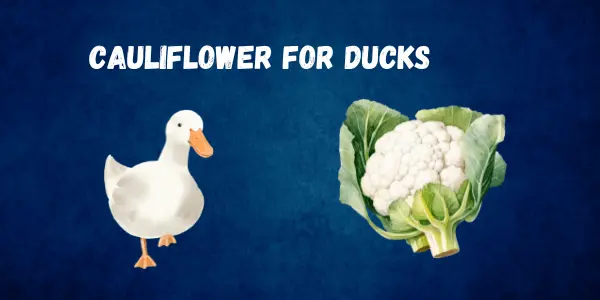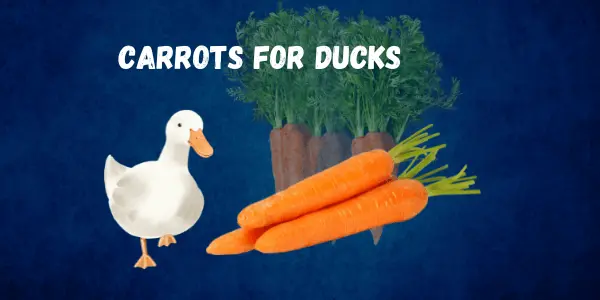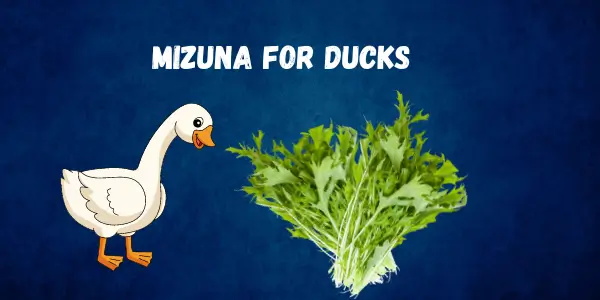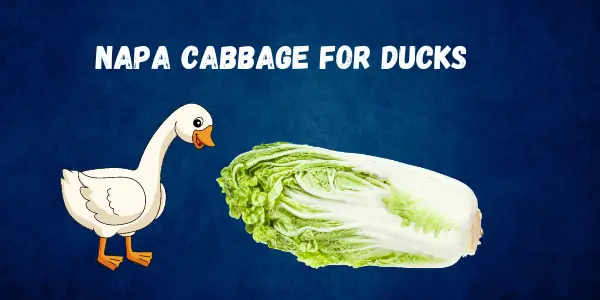Can Ducks Eat Cabbage? A Complete Guide
Published: 11 Sep 2024
Ducks thrive on a varied diet that includes grains, vegetables, and high-quality feed. Many duck owners wonder whether cabbage is a safe and nutritious option for their feathered friends. This guide explores the benefits, potential risks, and best ways to feed cabbage to ducks.
Understanding Ducks’ Diet and Nutrition
Ducks are omnivores, meaning they consume both plant-based and animal-based foods. Their natural diet includes:
- Insects, worms, and small aquatic creatures
- Grains like corn, wheat, and oats
- Seeds and nuts
- Vegetables and leafy greens
- Commercial duck feed formulated for balanced nutrition
A well-rounded diet ensures proper growth, strong immunity, and optimal egg production for laying ducks.

Can Ducks Eat Cabbage? – Is Cabbage Safe for Ducks?
Yes, ducks can eat cabbage in moderation. It is non-toxic and contains valuable nutrients that support overall health. However, feeding too much cabbage can interfere with thyroid function due to the presence of goitrogenic compounds.
Cabbage should be given in small amounts alongside other vegetables and a primary diet of duck feed. Chopping or shredding cabbage makes it easier for ducks to consume.
Nutritional Value of Cabbage for Ducks
Cabbage is a nutrient-dense vegetable that provides ducks with:
- Vitamin A – Supports vision, immunity, and skin health.
- Vitamin C – Enhances immunity and tissue repair.
- Vitamin K – Aids in blood clotting and bone strength.
- Calcium – Supports eggshell production and strong bones.
- Fiber – Promotes digestion and prevents constipation.
- Antioxidants – Help reduce inflammation and protect cells from damage.
While cabbage is a good source of essential nutrients, it should not replace a duck’s primary food source.
Health Benefits of Feeding Cabbage to Ducks
| Health Benefits of Feeding Cabbage to Ducks |
|---|
Vitamins and Minerals in CabbageCabbage offers a range of vitamins and minerals that contribute to a duck’s well-being. Vitamin A helps maintain healthy skin and feathers, while calcium supports strong bones and egg production. Antioxidants in cabbage protect against cellular damage, reducing the risk of illnesses. How Cabbage Supports Digestive HealthThe fiber content in cabbage aids digestion by promoting gut movement. Ducks consuming a fiber-rich diet experience fewer digestive problems, such as constipation or bloating. However, excessive cabbage intake may cause gas and discomfort, so moderation is essential. Can Cabbage Improve Feather Quality?Feathers are primarily composed of keratin, a protein that requires proper nutrition for maintenance. The vitamins and minerals in cabbage, particularly Vitamin A and antioxidants, contribute to feather health by promoting strong, vibrant plumage. Ducks fed a balanced diet, including leafy greens like cabbage, often display well-formed and glossy feathers. |
Different Types of Cabbage for Ducks: Which is Better for Them?
Ducks can eat different types of cabbage, but not all varieties are equally beneficial. Some types offer more nutrients, while others may be harder to digest. Here’s a breakdown of various cabbage types and whether they are safe for ducks.
Can Ducks Eat Raw Cabbage?
Yes, ducks can eat raw cabbage. It contains essential vitamins like Vitamin A, Vitamin K, and fiber, which support digestion and overall health. However, raw cabbage should be chopped into small pieces to prevent choking. Feeding in moderation is important, as excessive raw cabbage can interfere with thyroid function due to goitrogenic compounds.
Can Ducks Eat Cooked Cabbage?
Yes, cooked cabbage is safe for ducks and may be easier to digest. Cooking reduces the goitrogenic content, making it a safer option compared to raw cabbage. However, avoid adding salt, spices, or oils, as these can be harmful to ducks. Simply steaming or boiling cabbage and letting it cool before feeding is the best approach.
Can Ducks Eat Frozen Cabbage?
Ducks can eat frozen cabbage, but it should be thawed before feeding. Frozen vegetables can be hard and difficult to chew, posing a choking hazard. Once thawed, cabbage retains most of its nutrients and can be fed in small pieces as part of a balanced diet.
Can Ducks Eat Green Cabbage?
Yes, green cabbage is a good option for ducks. It is rich in vitamins, fiber, and antioxidants, which contribute to healthy digestion and feather maintenance. Chopping the leaves into manageable pieces makes it easier for ducks to eat.
Can Ducks Eat Red Cabbage?
Yes, red cabbage is safe for ducks and contains higher levels of antioxidants than green cabbage. These antioxidants help reduce inflammation and support overall health. However, like all types of cabbage, it should be given in moderation to avoid digestive issues.
Can Ducks Eat Savoy Cabbage?
Yes, ducks can eat Savoy cabbage. This variety is softer and more tender compared to other types, making it easier to chew and digest. It provides similar nutritional benefits as green and red cabbage, making it a good addition to a duck’s diet.
Avoid Feeding Moldy or Rotten Cabbage
Moldy or rotten cabbage should never be fed to ducks. Spoiled vegetables can contain harmful bacteria, fungi, and toxins that may lead to digestive problems, food poisoning, or infections. Always check cabbage leaves for signs of decay before offering them to ducks.
Can Ducks Eat Pickled or Spoiled Cabbage?
No, ducks should not eat pickled or spoiled cabbage. Pickling involves fermentation, which introduces high levels of salt, vinegar, and preservatives that are harmful to ducks.
Why Pickled Cabbage is Unsafe for Ducks
Pickled cabbage contains:
- Excess salt – Ducks cannot process large amounts of sodium, leading to dehydration and kidney stress.
- Vinegar and preservatives – These can cause digestive irritation and disrupt a duck’s gut balance.
- Fermentation gases – These may lead to bloating and discomfort.
To keep ducks healthy, always provide fresh, raw, or cooked cabbage without additives. Avoid feeding any processed or spoiled vegetables.
Can Ducklings Eat Cabbage?
Ducklings have different dietary needs than adult ducks, requiring a balanced diet for healthy growth. While cabbage can be part of their diet, there are some precautions to consider.
Is Cabbage Safe for Baby Ducks?
Yes, cabbage is generally safe for ducklings when given in small amounts. It provides essential nutrients like Vitamin A, Vitamin K, and fiber. However, feeding too much cabbage can interfere with thyroid function due to goitrogenic compounds. Ducklings should have a diet primarily based on high-quality duck starter feed, with vegetables like cabbage offered occasionally.
How to Introduce Cabbage to Ducklings
When introducing cabbage to ducklings, start with tiny amounts mixed with their regular feed. Offer finely chopped or shredded cabbage to prevent choking. Monitor their reaction and ensure it does not cause digestive upset. Gradual introduction helps ducklings adjust to new foods without disrupting their digestion.
How to Prepare Cabbage for Ducks
To make cabbage easier for ducks to eat, wash it thoroughly and chop it into small pieces. Removing tough stems can also prevent choking. Cooking cabbage by steaming or boiling can make it softer and reduce its goitrogenic content, making it a safer option.
Best Portion Sizes for Ducks
Cabbage should be a treat, not a primary food source. For adult ducks, a few small pieces mixed with their diet a couple of times per week is enough. For ducklings, even smaller amounts should be given, ensuring it does not replace their main nutrition source. Overfeeding cabbage can lead to imbalances in their diet.
Mixing Cabbage with Other Duck Feed
Cabbage can be combined with high-quality duck feed or other vegetables to create a varied diet. Mixing it with foods like leafy greens, peas, and duck pellets ensures a balance of nutrients. However, avoid feeding only cabbage, as ducks require a diverse diet for optimal health.
Risks and Precautions When Feeding Cabbage to Ducks
While cabbage is generally safe, there are risks associated with overfeeding. Ducks need a balanced diet to avoid potential health issues.
Can Too Much Cabbage Harm Ducks?
Yes, excessive cabbage consumption can interfere with nutrient absorption, leading to deficiencies. Overeating cabbage may also cause bloating and digestive discomfort in ducks. Feeding cabbage in moderation ensures they get the benefits without negative effects.
Goitrogenic Agents in Cabbage and Their Effects on Ducks
Cabbage contains goitrogenic compounds that can interfere with thyroid function by reducing iodine absorption. In large quantities, this can lead to thyroid gland enlargement (goiter) and impact overall health. Cooking cabbage helps lower these compounds, making it safer for ducks.
Signs of Digestive Issues from Cabbage
If ducks consume too much cabbage, they may show signs of digestive discomfort, including:
- Loose stools or diarrhea
- Reduced appetite
- Lethargy or decreased activity
If these symptoms occur, reduce cabbage intake and ensure they have access to fresh water and a balanced diet.
How Often Should Ducks Eat Cabbage?
Cabbage can be a nutritious addition to a duck’s diet, but it should be fed in moderation. Ducks require a balanced diet to maintain their health and growth, so understanding the right frequency and portion sizes is essential.
Ideal Frequency and Serving Sizes
Ducks can eat cabbage two to three times per week in small amounts. Overfeeding cabbage can cause digestive discomfort and interfere with nutrient absorption. An appropriate serving size for an adult duck is a few small pieces per feeding, while ducklings should be given even smaller portions.
To ensure safe consumption:
- Chop cabbage into small, manageable pieces.
- Mix it with their regular feed.
- Provide plenty of fresh water.
Balancing Cabbage with Other Foods
Cabbage should not replace a duck’s primary diet, which consists of:
- High-quality duck pellets (the main food source)
- Vegetables (peas, lettuce, kale, and cabbage in moderation)
- Seeds and grains (oats, barley, corn)
- Protein sources (mealworms, small fish)
Feeding too much cabbage can reduce the intake of essential nutrients found in other foods. A well-balanced diet ensures ducks get all the necessary vitamins and minerals.
Comparing Cabbage to Other Leafy Greens
While cabbage is a good source of vitamins and fiber, other leafy greens can provide similar or better nutritional value:
| Leafy Green | Benefits for Ducks | Feeding Frequency |
| Kale | High in Vitamin K and calcium | 2-3 times per week |
| Lettuce (except iceberg) | Hydrating and low in calories | 3-4 times per week |
| Spinach | Rich in iron but contains oxalates | Occasionally in small amounts |
| Swiss Chard | Contains essential nutrients but should be limited due to oxalates | 1-2 times per week |
Ducks can enjoy a variety of leafy greens, but it is important to rotate them to maintain a balanced diet.
Conclusion
Ducks can eat cabbage, but it should be fed in moderation alongside other nutrient-rich foods. Providing cabbage 2-3 times per week in small portions ensures they receive the benefits without negative effects. Balancing cabbage with other vegetables, grains, and protein sources is key to maintaining a healthy diet for ducks. Always monitor their health and adjust their diet as needed.

- Be Respectful
- Stay Relevant
- Stay Positive
- True Feedback
- Encourage Discussion
- Avoid Spamming
- No Fake News
- Don't Copy-Paste
- No Personal Attacks

- Be Respectful
- Stay Relevant
- Stay Positive
- True Feedback
- Encourage Discussion
- Avoid Spamming
- No Fake News
- Don't Copy-Paste
- No Personal Attacks





